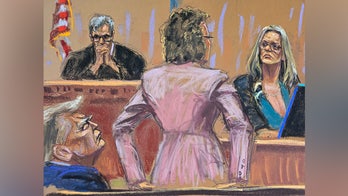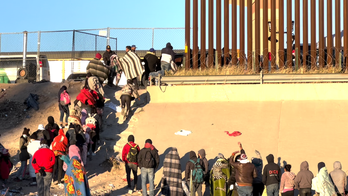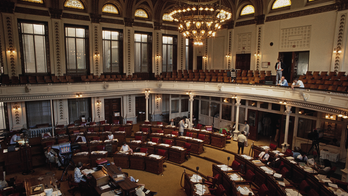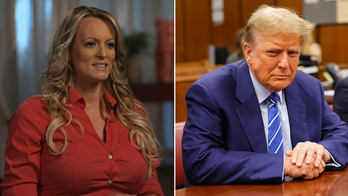Administration officials responded Sunday to criticism that the president witnessing the return of caskets of fallen military personnel at Dover Air Force Base in Delaware last week was a photo-op. The move of the commander-in-chief to visit the air force base for the very somber experience was met with both praise and negative reaction.
“Well, he wouldn't have done it in public if the families had objected,” White House Senior Adviser Valerie Jarrett said on ABC’s This Week with George Stephanopoulos. “So the first and foremost thing is what is important to the families. And I think that it's important for us all to recognize what is at stake…I think it's a reminder about how deep the sacrifice is,” she added.
Media presence at Dover is something the Obama administration reversed from the George W. Bush White House. Cameras are allowed to tape and photograph the flag-draped caskets return, called a “dignified transfer”, if the family of the fallen agrees to allow it.
On Friday there were 18 dignified transfers at the air force base for Americans killed in Afghanistan earlier in the week.
This was the first time a president has visited Dover in recent memory. Former President Bush never went to Dover, and said the appropriate way to show his respect was meeting military families in private.
The family of Sgt. Dale R. Griffin, of Terre Haute, Ind, allowed his transfer to be witnessed by the press pool while the president was there early Friday morning. Other families did not.
President Obama also met with military families of those fallen while at Dover, something the White House did not allow to be taped or photographed.
Jarrett also said that the visit had to do with openness, “And it's something that's open and transparent, and it was a way for him as the president to convey to those families on behalf of the American people how much we appreciate that enormous sacrifice they've made.”
Meanwhile in an interview on Fox News Sunday, criticism on the visit came swinging from conservative talk show host Rush Limbaugh. Host Chris Wallace asked if Limbaugh could at least give him credit for going to Dover. Limbaugh couldn’t. “It was a photo op. It was a photo op precisely because he's having big-time trouble on this whole Afghanistan dithering situation. He found one family that would allow photos to be taken. None of the others did, ” he said.
Limbaugh went on to slam the media, “And of course, when you have a sycophantic media following you around, able to promote and amplify whatever you want, then he can create the impression that he has all this great concern…”
Wallace also pressed if it was also political of the Bush administration to not allow cameras at Dover. “Well, I have the benefit of knowing George Bush a little bit, and I -- I -- I've seen him cry talking about missions that he's ordered. I think he has a great, profound, deep respect for the families of all military personnel, and those who have died...”
White House Senior Adviser David Axelrod appeared on CBS’ Face the Nation and responded to Limbaugh’s comments, “My reaction is that I think that the president of the United States went to Dover to represent the American people and pay his respects to the families who had made so much of a sacrifice, to those brave service people who made the ultimate sacrifice. It was the appropriate thing to do. And I think most Americans appreciate that.”
Also on CBS, Senator Joe Lieberman (I-CT) praised the president’s trip and waved off criticism, “…I think he was there as commander in chief for all Americans. And I don't fault him or question his motives at all. I was proud that my president was there.”
On Friday, the president said the sobering experience will influence his decision on sending more troops to Afghanistan. "The burden that both troops and families bear in any war-type situation is gonna bear on how I see these conficts. It's something I think about each and every day," he said.
Officials have said President Obama is said to be close to making a decision on US troop levels in Afghanistan and that it could be made in the coming weeks. October has been the bloodiest month for US troops since the war began eight years ago.
--The Associated Press contributed to this report




